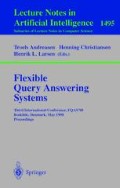Abstract
The client-server model is being used mostly in the actual DataBase Management Systems (DBMS). However, these DBMS do not allow either to make flexible queries to the database or to store vague information in it. We have developed a FSQL Server for a Fuzzy Relational Database (FRDB). The FSQL language (Fuzzy SQL) is an extension of the SQL language that allows us to write flexible conditions in our queries. This Server has been developed for Oracle, following the model GEFRED, a theoric model for FRDB that includes fuzzy attributes to store vague information in the tables. The FSQL Server allows us to make flexible queries about traditional (crisp) or fuzzy attributes and we can use linguistic labels defined on any attribute.
Preview
Unable to display preview. Download preview PDF.
References
P. Bosc, O. Pivert, K. Farquhar, “Integrating Fuzzy Queries into an Existing Database Management System: An Example”. International Journal of Intelligent Systems, Vol. 9, 475–492 (1994).
B.P. Buckles, F.E. Petry, “A Fuzzy Representation of Data for Relational Databases”. Fuzzy Sets and Systems 7, 213–226 (1982).
B.P. Buckles, F.E. Petry, “Extending the Fuzzy Database with Fuzzy Numbers”. Information Sciences 34, 145–155 (1984).
D.D. Chamberlin, R.F. Boyce, “SEQUEL: A Structured English Query Language”. Proc. ACM SIGMOD Workshop on Data Description. Access and Control, 1974.
D.D. Chamberlin et al., “SEQUEL 2: A Unified Approach to Data Definition, Manipulation and Control”. IBM J. R&D 20, num. 6, November, 1976.
E.F. Codd, “A Relational Model of Data for Large Shared Data Bases”. Communications of the ACM, 13, no. 6, 377–387, June 1970.
S. Fukami, M. Umano, M. Muzimoto, H. Tanaka, “Fuzzy Database Retrieval and Manipulation Language”, IEICE Technical Reports, Vol. 78, Nℴ 233, pp. 65–72, AL-78-85 (Automata and Language) (1979).
J. Galindo, J.M. Medina, M.C. Aranda, “Una solución al problema de la División Relacional Difusa”. VII Congreso Español sobre Tecnologías y Lógica Fuzzy (ESTYLF'97). Tarragona (Spain), September 1997.
J. Galindo, J.M. Medina, J.C. Cubero, “How to Obtain the Fulfilment Degrees of a Query using Fuzzy Relational Calculus”. To appear in “Knowledge management in Fuzzy Databases”. Eds. O. Pons, M.A. Vila and J. Kacprzyk. Ed. Physica-Verlag, 1998.
J. Galindo, J.M. Medina, O. Pons, M.A. Vila, J.C. Cubero, “A prototype for a fuzzy relational database”. Demo session in the 6th International Conference on Extending Database Technology, Valencia (Spain), March 1998.
J. Galindo, J.M. Medina, A. Vila, O. Pons, “Fuzzy Comparators for Flexible Queries to Databases”. Iberoamerican Conference on Artificial Intelligence, IBERAMIA'98, Lisbon (Portugal), October 1998.
J.M. Medina, O. Pons, M.A. Vila, “GEFRED. A Generalized Model of Fuzzy Relational Databases”. Information Sciences, 76(1–2), 87–109 (1994).
J.M. Medina R., “Bases de Datos relationales difusas. Modelo teórico y aspectos de su implementación”. Ph. Doctoral Thesis, University of Granada, May 1994.
H. Prade, C. Testemale, “Generalizing Database Relational Algebra for the Treatment of Incomplete or Uncertain Information and Vague Queries”. Information Sciences 34, 115–143 (1984).
H. Prade, C. Testemale, “Fuzzy Relational Databases: Representational issues and Reduction Using Similarity Measures”. J. Am. Soc. Information Sciences 38(2), 118–126 (1987).
V. Tahani, “A Conceptual Framework for Fuzzy Query Processing-A Step toward Very Intelligent Database Systems”. Information Process. Management, 13, 289–303 (1977).
M. Umano, S. Fukami, M. Mizumoto, K. Tanaka, “Retrieval Processing from Fuzzy Databases”. Technical Reports of IECE of Japan, Vol 80, No. 204 (on Automata and Languages), pp. 45–54, AL80-50 (1980).
M. Umano, “Freedom-O: A Fuzzy Database System”. Fuzzy Information and Decision Processes. Gupta-Sanchez edit. North-Holand Pub. Comp. (1982).
M. Umano, S. Fukami, “Fuzzy Relational Algebra for Possibility-Distribution-Fuzzy Relational Model of Fuzzy Data”. Journal of Intelligent Information Systems, 3, 7–27 (1994).
L.A. Zadeh, “Fuzzy Sets as a Basis for a Theory of Possibility”. Fuzzy Sets and Systems, 1, 3–28 (1978).
M. Zemankova-Leech, A. Handel, “Fuzzy Relational Databases — A Key to Expert Systems”. Köln, Germany, TüV Rheinland (1984).
Author information
Authors and Affiliations
Editor information
Rights and permissions
Copyright information
© 1998 Springer-Verlag Berlin Heidelberg
About this paper
Cite this paper
Galindo, J., Medina, J.M., Pons, O., Cubero, J.C. (1998). A server for Fuzzy SQL queries. In: Andreasen, T., Christiansen, H., Larsen, H.L. (eds) Flexible Query Answering Systems. FQAS 1998. Lecture Notes in Computer Science, vol 1495. Springer, Berlin, Heidelberg. https://doi.org/10.1007/BFb0055999
Download citation
DOI: https://doi.org/10.1007/BFb0055999
Published:
Publisher Name: Springer, Berlin, Heidelberg
Print ISBN: 978-3-540-65082-9
Online ISBN: 978-3-540-49655-7
eBook Packages: Springer Book Archive

